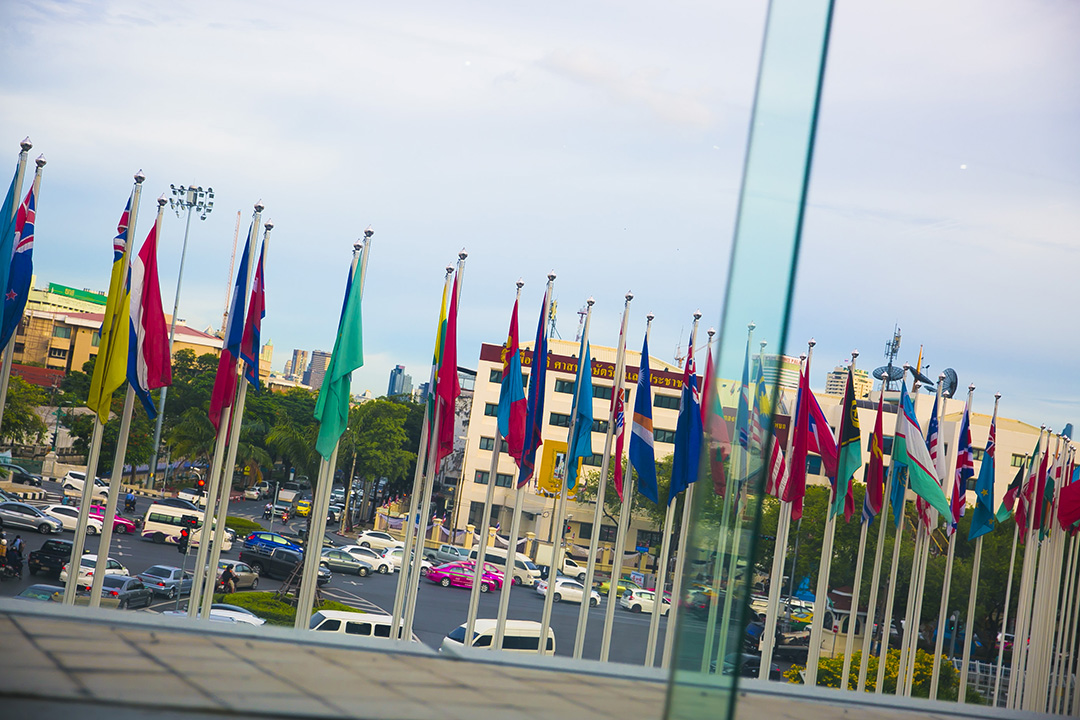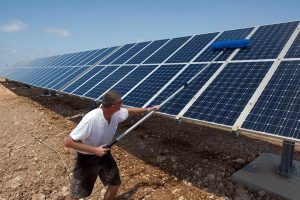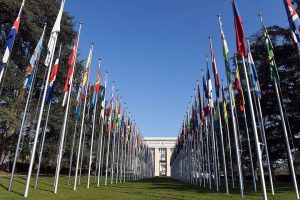This SDG Knowledge Weekly follows energy-related events in Bangkok and Geneva, as governments and stakeholders begin preparing for the review of SDG 7 (affordable and clean energy) at this year’s session of the UN High-level Political Forum on Sustainable Development (HLPF). As energy is a ‘nexus issue’ that spans the breadth of the SDGs, our attention was also drawn to knowledge products that directly link energy to decent jobs (SDG 8), infrastructure (SDG 9) and climate action (SDG 13).
The Global Preparatory Meeting for Review of SDG 7 took place from 21-23 February, in Bangkok, Thailand, organized by the UN Department of Economic and Social Affairs (DESA), the UN Economic and Social Commission for Asia and the Pacific (ESCAP), and the Thai Ministry of Energy. The meeting highlighted progress on energy access in the Asia-Pacific region, but also remaining challenges. In her opening remarks, ESCAP Executive Secretary Shamshad Akhtar noted that the region remains “the most energy intensive” in the world. The SDG Knowledge Hub summary of the meeting is here.
As an input to the assessment of SDG 7, a series of 27 policy briefs was developed by the Ad Hoc Informal Multi-stakeholder Technical Group of Advisors on SDG 7. Each brief features key messages and statistics on progress so far, as well as priority actions to accelerate movement towards the Goal. The briefs are categorized into four sections: 1) advancing SDG 7 implementation; 2) interlinkages between SDG 7 and other Goals; 3) regional perspectives; and 4) “toward a sustainable and equitable energy future.”
Under the first heading, the papers look at trends in achieving universal access to electricity and clean cooking fuels, increasing the share of renewables in the global energy mix, financing SDG 7 and more. The brief on electricity access notes the difference between having a source of electricity and having universal access, cautioning that the former does not guarantee the latter. The brief on cooking fuels highlights that 40% of households (3 billion people) still prepare meals using “traditional” stoves, which poses a risk to both human health and the environment. It notes that upwards of 4.3 million deaths each year are attributable to household air pollution, and lists priority actions for policy, planning, finance and monitoring, such that clean cooking fuels can be realized for all. The brief on increasing the share renewables notes that 80% of total final energy consumption derives from fossil fuels, but that 60% could of electricity be generated by renewables by 2030. The finance brief highlights the importance of policy measures on both the demand-side (i.e. de-risking investment, carbon pricing) and supply-side (financial system reform). It also outlines the potential for financial technology (“fintech”) solutions to facilitate the development of small-scale, distributed energy systems.
A brief linking energy, climate and transport calls for prioritizing alternative forms of mobility, such as walking, cycling and public transit.
Ten policy briefs highlight linkages between SDG 7 and other Goals. The brief linking energy to poverty and inequality highlights that “energy is a precondition for economic development,” meaning that achieving SDG 7 is not only a goal in itself, but also a means of achieving others. The water-energy-food nexus brief notes that policy coherence is key to managing tradeoffs and synergies, given increasing needs across all three areas. Connecting energy to health, Policy Brief #10 recalls the above statistic on clean cooking fuels, also describing how energy enables health services (i.e. through vaccine refrigeration and equipment sterilization) and offering examples of how SDG 7 contributes to targets under SDG 3. The briefs linking energy to climate and transport call for prioritizing reduced emissions and alternative forms of mobility, such as walking, cycling and public transit.
The ‘Regional Perspective’ category dedicates papers to energy trends in Africa, the Asia-Pacific region, Europe, Latin America and the Caribbean, and the Arab region, as well as a brief covering Least Developed Countries (LDCs), Landlocked Developing Countries (LLDCs) and Small Island Developing States (SIDS). The fourth category unpacks long-term and systemic issues, such as energy pathways to 2050 and the linkages between indicators, data and energy. The papers were developed in conjunction with stakeholders from the UN system, bilateral governments, multilateral actors and civil society.
During the meeting, the International Renewable Energy Agency (IRENA) released a report titled, ‘Renewable Energy Market Analysis: Southeast Asia.’ The report describes macroeconomic and social trends, analyzes the current energy landscape and recent investment and deployment trends, and outlines the benefits of decentralized renewable energy. It finds that, although 65 million people in the region currently lack reliable electricity access, there remains potential to tap significant renewable energy resources whilst adding jobs in the energy sector. The report makes a case for diversifying energy production through renewables, noting that there were over 611,000 renewable energy jobs in the region as of 2016. The report also highlights socio-economic, health and environmental benefits from decentralized renewable energy, offering a goal-level mapping to the SDGs starting on page 131.
As previewed in last week’s SDG Knowledge Weekly, the Regional Forum on Sustainable Development for the UN Economic Commission for Europe (ECE) Region convened from 1-2 March in Geneva, Switzerland. The Forum discussed Goal 7 among the other SDGs to be reviewed at the HLPF. Case studies of national experiences in implementing the Goals in ECE countries were provided by governments and other stakeholders for discussion at the meeting. They examine how energy systems are being made more efficient, what initiatives have enabled increased investment, and the policies and measures that have been implemented to “accelerate the transition to sustainable energy.” A session on ‘transforming energy in support of the 2030 Agenda’ explored the reconciliation of countries’ emissions targets under the Paris Agreement on climate change with their short-term reliance on fossil fuels.
Additional knowledge products were released outside of the meetings. A separate report by IRENA finds that, despite the EU’s current reliance on fossil fuels, member countries “could cost effectively double the share of renewable energy by 2030.” The finding, one of many from ‘Renewable Energy Prospects for the European Union,’ comes as part of a broader, bottom-up REmap analysis that assesses and aggregates countries’ and regions’ renewable energy potential. REmap’s aim is to build a roadmap that looks not only on technologies for electricity, but also for heating, cooling and transportation
A joint report by Bloomberg New Energy Finance (BNEF) and Facebook looks at options for bridging the “digital divide,” noting that nearly 4 billion people lack internet access. Titled ‘Powering Last-Mile Connectivity,’ the paper frames the issues partly as one of a need for better infrastructure to increase efficiency. The paper cites that mobile network operators spend up to US$3.8 billion on fuel alone to power infrastructure, and that for consumers, charging mobile phones is both costly and time-consuming if charging points are far away, as is often the case in rural areas. The findings highlight the importance of the interlinkages across the SDGs, particularly the interface between SDG 7 and SDG 9,
The Center for Global Development released a policy paper titled, ‘What Can We Learn about Energy Access and Demand from Mobile-Phone Surveys? Nine Findings from Twelve African Countries.’ While not explicitly covering SDG 7, the paper offers insight as to both survey techniques and challenges facing universal access to energy services (SDG target 7.1).
At the city level, new analyses by CDP find that 102 cities worldwide now source at least 70% of their electricity from renewable energy sources. Detailed coverage of the CDP report, and related energy news from the BP, Coal India, and the Government of Ireland, is available on the SDG Knowledge Hub.
Additional issues of the SDG Knowledge Weekly can be found here.


